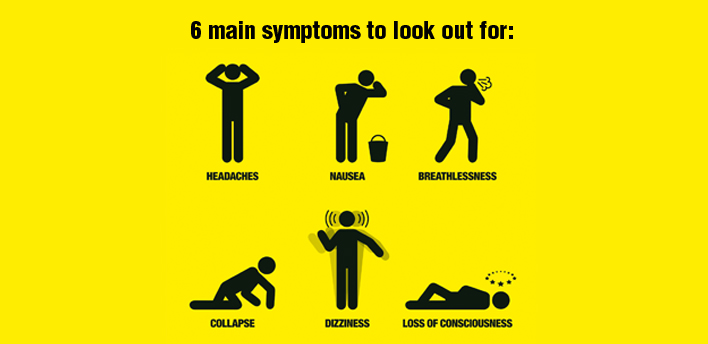Unsafe gas appliances can produce a highly poisonous gas called carbon monoxide (CO). It can cause death as well as serious long term health problems such as brain damage.
When this happens, the blood is no longer able to carry oxygen, and this lack of oxygen causes the body’s cells and tissue to fail and die.
Symptoms of carbon monoxide poisoning
The symptoms of carbon monoxide poisoning aren’t always obvious, particularly during low-level exposure.
A tension-type headache is the most common symptom of mild carbon monoxide poisoning. Other symptoms include:
- dizziness
- nausea (feeling sick) and vomiting
- tiredness and confusion
- stomach pain
- shortness of breath and difficulty breathing
The symptoms of exposure to low levels of carbon monoxide can be similar to those of food poisoning and flu. But unlike flu, carbon monoxide poisoning doesn’t cause a high temperature (fever).
The symptoms can gradually get worse with prolonged exposure to carbon monoxide, leading to a delay in diagnosis.
Your symptoms may be less severe when you’re away from the source of the carbon monoxide. If this is the case you should investigate the possibility of a carbon monoxide leak, and ask a suitably qualified professional to check any appliances you think may be faulty and leaking gas.
The longer you inhale the gas, the worse your symptoms will be. You may lose balance, vision and memory and, eventually, you may lose consciousness. This can happen within two hours if there’s a lot of carbon monoxide in the air.
Long-term exposure to low levels of carbon monoxide can also lead to neurological symptoms, such as difficulty thinking or concentrating and frequent emotional changes – for example, becoming easily irritated, depressed or making impulsive or irrational decisions.

What to do if you suspect CO poisoning
- Get fresh air immediately. Open doors and windows, turn off gas appliances and leave the house.
- See your doctor immediately or go to hospital – let them know that you suspect CO poisoning. They can do a blood or breath test to check.
- If you think there is an immediate danger, call the Gas Emergency Helpline on 0800 111 999.
- Ask a Gas Safe registered engineer to inspect your gas appliances and flues to see if there is a dangerous problem.
To view the full article, please visit the incredibly informative Gas Safe article by clicking on the following link – https://www.gassaferegister.co.uk/help-and-advice/carbon-monoxide-poisoning/
Last Updated on April 24, 2019 
